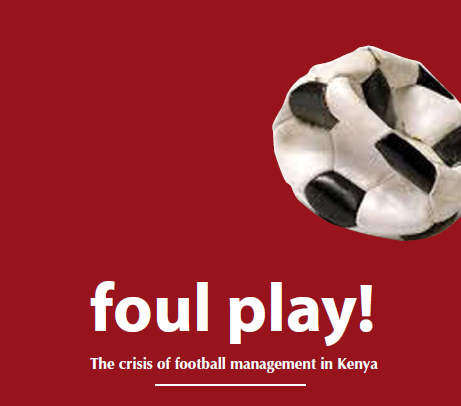The brief history of Kenya football governance since Independence Kenya goes to a historic national football election this morning, seeking to put to rest the wrangles that have seen the game deteriorate over the past decade. Whoever wins joins a long list of people who have run the game since 1963. There have been highs and lows over the years.
Kenya’s post colonial football governance started with the 1963 election of Isaac Lugonzo then Nairobi Mayor. John Kasyoka took over in the mid-60s to 1970 as an elected chairman. He was followed by Martin Shikuku in 1970. However, Shikuku’s term was brought to an abrupt end in 1972 when the then Butere MP’s football association was disbanded by the government on allegations of corruption. Shikuku’s ouster ushered in a caretaker committee headed by Bill Martin who was Nairobi Provincial Commissioner.
An election was called the same year and Williams Humphreys Ngaah a Kenya Railways officer was duly elected for the remainder of the term.
Ngaah lost the subsequent election in 1974 to Dan Owino , a former Kenya diplomat under circumstances which saw Kenneth Matiba the chairman of Kenya Breweries FC (now Tusker FC) locked out. Matiba walked out of the Kenya Football Association to form the rival Kenya Football Federation which quickly gained favour with clubs and lasted two terms to 1984.
Matiba’s popularity saw him join Parliament as MP for Kiharu (1983-90; 92-97), was cabinet minister between 1985-88 and Presidential candidate in 1992.
Clement Gachanja, MP for Dagoretti was elected KFF chairman for the 1984-88 term before Job Omino was elected. Omino’s committee was disbanded by government and a caretaker committee was set up with Mathews Adams Karauri as chairman
In the subsequent election in 1990, Job Omino bounced back and was in office until 1996. Peter Kenneth took over from Omino in the 1996-2000 team when Maina Kariuki took over as Kenya football helmsman in 2001. His term was also cut short when, on grounds, of corruption, the government disbanded the office in 2004. However, the international football federation Fifa intervened and a joint Fifa and Kenya government committee headed by Kenya legendary athlete Kipchoge Keino was appointed to lay the groundwork for elections in 2004 under a blended constitution.
This saw Alfred Sambu take office. But he was thrown out by a rebel group which had powerful support from the Ministry of sport in 2007. So the crucial moment appears to have been in the year 2000 according to AfriCOG an NGO that traced the beginning of the Kenya tooball crisis.
Soon after the KFF headed by Maina Kariuki (chairman), Hussein Swaleh (secretary general) and Mohammed Hatimy (treasurer) was elected.
The then Sports Minister Francis Nyenze who, among many reasons, cited corruption and mismanagement of resources as reason for his decision. Nyenze appointed a caretaker committee but his decision was reversed by the High Court. A year later, 11 Premiership clubs broke ranks with KFF to form the Kenya Premier Football Group (KPFG). Kenyan Premier League Ltd (KPL) was formed as a private company the same year.
In 2004, after the expiry of Kariuki and his offices’ tenure of office, the Mombasa High Court ruled against their stay prompting the sports minister to form a Stakeholders’ Transitional Committee (STC).
The wrangles then moved a notch higher leading to the collapse of the KFF league. KPFG later formed a Harambee Stars Management Board to prepare the team ahead of the Africa Cup of Nations and 2010 World Cup qualifiers. However, the ambitions were short-lived as Fifa suspended Kenya’s membership over alleged government interference.
Fifa and the government later entered into negotiations which establishment the KFF Normalisation Committee headed by Kenya athletics legend Kipchoge Keino, mandated to develop a new KFF constitution in time for elections in December 2004, and unify the KFF and KPFG leagues. A KFF Special General Meeting elected Alfred Sambu as chairman and Hatimy as senior vice-chairman.
In August 2005, a KFF SGM replaced Sambu with Hatimy, who was later banned from football management by Fifa. Fifa also gave KFF three months to put their house in order.
Sambu was reinstated in 2006 with Moni Wekesa becoming his secretary general. Kenya and KFF were later banned from Fifa football activities with Hatimy dramatically replacing Sambu, again. A year later, Fifa named Hatimy as the acting national chairman pending elections in May 2007.
The polls saw two parallel SGMs held in Nairobi and Mombasa by former secretary general Sam Nyamweya and Hatimy respectively where Nyamweya was appointed chairman by the government recognized KFF.
In May 2008, KFF obtained a court injunction barring Hatimy from interfering with their affairs; a move that irked Fifa, whose statutes do not allow the involvement of ordinary courts in football matters. Hatimy later registered Football Kenya Limited (FKL) with the Registrar of Companies, with the blessings of Fifa.
Fifa refused to start arbitration procedure requested for by KFF and subsequently, the Court of Appeal (after an appeal by KFF) decided in Hatimy’s favour.
However, the court directed the status quo remain until elections were held later in December. In February 2009 Fifa disowned KFF. The then sports minister Hellen Sambili appointed a committee led by Bidco CEO Vimal Shah to reconcile the two factions. The committee failed in its mandate.
In January 2010 the Court of Arbitration for Sport (CAS) acting on a case filed by Nyamweya recognised FKL as opposed to KFF and called on the country to hold fresh elections to end the wrangles that have seen the country’s football sink to worrying depths.
Copyright Nairobi Star. Distributed by AllAfrica Global Media (allAfrica.com).
